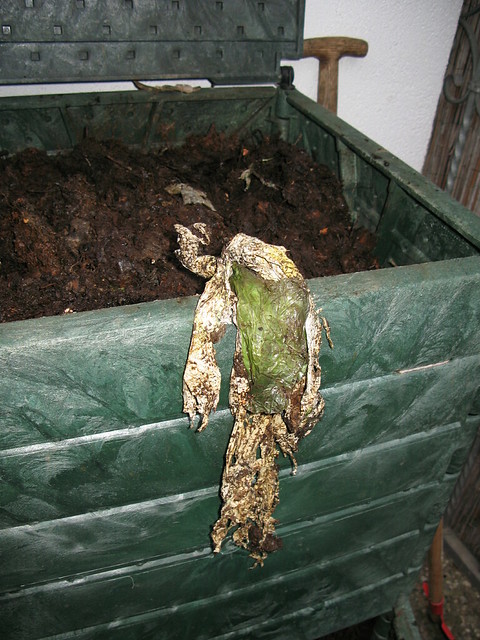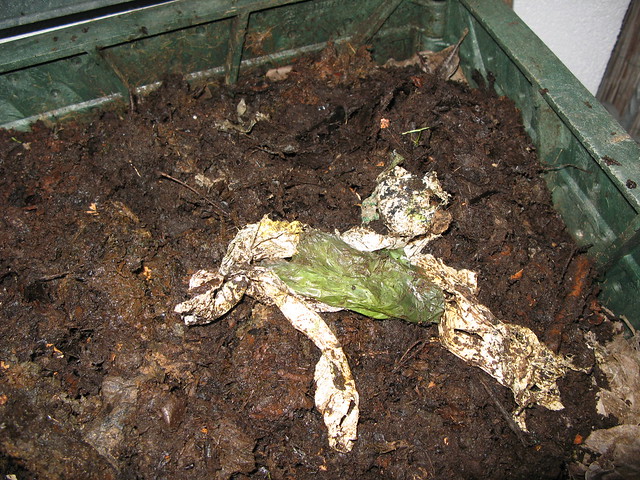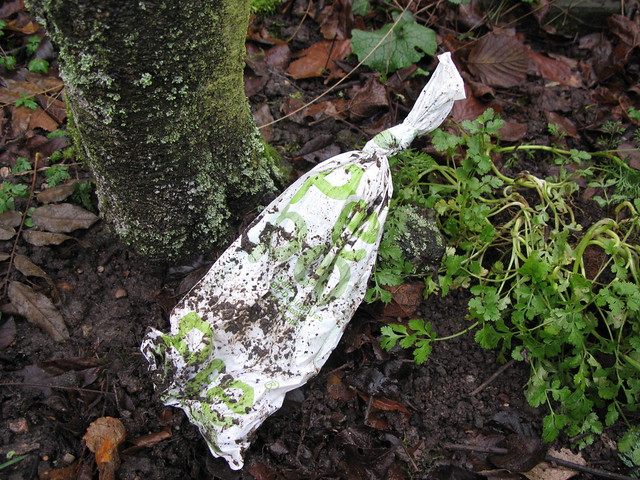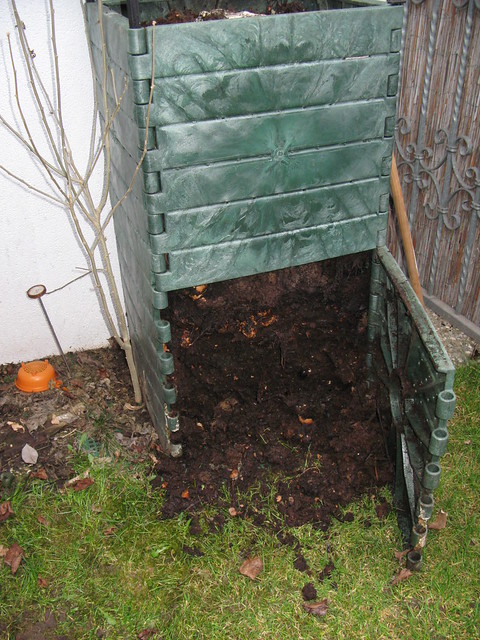- Sanitation systems
- Toilets without urine diversion
- Container-based, mobile or bag-based toilets
- Peepoo bags in Kenyan urban slums: experiences, ideas and research
Peepoo bags in Kenyan urban slums: experiences, ideas and research
35.4k views
- tmsinnovation
-

- Moderator
- I manage the Decentralized Wastewater Management for Adaptation to Climate Change in Jordan (ACC Project) and previously coordinated the Climate-friendly sanitation services in peri-urban areas of Lusaka project in Zambia. My background is in Management, Economics and Information Systems.
Less- Posts: 162
- Karma: 4
- Likes received: 53
Thanks for the photos.
It appears from the photos that your composter is extremely compact and that there is not a lot of air flow within the composter. Are there air holes on one or other side of the composter?
Rgds
Trevor
++++++++++++++
Answer by EvM:
Yes, there are holes in the sides. They are maybe 3 mm in diameter, difficult to see in the photos. Apparently that should be enough for aeration? But the compaction is a problem
---> more about Peepoo bags is now in this new thread:
forum.susana.org/forum/categories/52-mob...-contracts-peepoople
Decentralized Wastewater Management for Adaptation to Climate Change in Jordan (ACC Project)
Project Manager
Deutsche Gesellschaft für
Internationale Zusammenarbeit (GIZ) GmbH
Ministry of Water and Irrigation, Shmeisani,
Amman
Jordan
- Elisabeth
-
- User is blocked
- Freelance consultant since 2012
Less- Posts: 3372
- Karma: 54
- Likes received: 932
Re: How well do peepoo bags degrade in a home composter?
Just as an interesting aside: I recently did some mixing in my home composter, taking stuff from the bottom to the top, and was surprised to find still a large chunk of a Peepoo bag, which had been in this composter for about 2 years. (I had once tested my own Peepoo bag - you must always try things out yourself if you want others to believe you - and afterwards I had put the full bag into my home composter).
So this little experiment is suggesting to me that a normal home composter in a cold country, which is not operated optimally and certainly does not achieve the same temperature increase as an industrial composting process, is not a place where a Peepoo bag will disappear in months or up to a year.
I am not very good at composting so it is certainly not an optimised process. Maybe it is more similar to the conditions if the bags had been buried in the ground. And of course it is much colder here than in Kenya! One thing is for sure: the content of the bag (i.e. my faeces) was long gone and converted to good soil.
Here are some photos of the bag as I found it again in the bottom of the composter:

Compost about two years old (old Peepoo bag still visible after two years) by Sustainable sanitation , on Flickr

Compost about two years old (old Peepoo bag still visible after 2.5 years) by Sustainable sanitation , on Flickr
And this is what the full bag looked like 2 years earlier:

Filled PeePoo bag after about one month in the soil in the garden in Germany (November 2008) by Sustainable sanitation , on Flickr
Here is what my composter and the compost looks like:

Compost about two years old by Sustainable sanitation , on Flickr
More photos from Peepoo bags in Kenya are by the way available here in our flickr collection:
www.flickr.com/photos/gtzecosan/sets/72157627738956071/
Regards,
Elisabeth
Freelance consultant on environmental and climate projects
- Camilla
-

- Co-founder of Peepoople and recently launched new MHM project and campaign called The Cup
Less- Posts: 26
- Karma: 7
- Likes received: 20
Re: Peepoo bags in Kenyan urban slums: experiences, ideas and research
Thank you for your message and support for the Peepoo project in Kibera.
I am sorry if I might repeat myself in this forum. I just wanted to add that being without a toilet and not being able to solve this urgent problem when needed, is what is not dignified or rather inhuman. We, who live in this other world, have a toilet within half an hour all our life more or less.
Dignity is also about having a clean toilet, no need to share with many and of course privacy.
Again, I invite you all to visit our homepage and read the stories from Kibera from users and our team how it is working right now: www.peepoople.com
Best
Camilla
The Cup
- nazir
-
 Less
Less- Posts: 34
- Likes received: 4
Re: Peepoo bags in Kenyan urban slums: experiences, ideas and research
As we are all aware, many countries in Africa has a dire need for safe sanitation solutions.Kibera is not an easy place to work in and in many areas it becomes very difficult to construct a long drop toilet. I would say that looking at this technology, the idea must of come up to address the urgent needs of the people and communities in this area.
We have many solutions offered around the world, many to me seems unaffordable and can only work if donor funds are available. The sad thing is that people need safe sanitation and we should welcome any technology that is addressing these problems.
Governments are not interested. Yet we hear that the Peepoo is undignified. Flying toilets, using rivers and dams etc are also not dignified.
2.6 billion people are without proper water & sanitation.
We need to get these numbers down. The only way we are able to do this is to unite and share and understand technologies, implement suitable and affordable solutions.
Is this a long term solution?
I would say it is because it's a better alternative compared to plastic bags.
I know for a fact that if I were to introduce this technology in South Africa, I would be shot by our people. In Kenya it's working and we should support them.
I have friends who have access to the internet, cell phones and don't have a toilet. So it makes one think where are the priorities of people.Government introduces systems that cannot be supported, at present we are faced with a problem of honeysuckers not able to go into certain areas or the operators are unable to cope.
In conclusion, I am really happy to see that someone has found a solution that might not be favourable to many, but Kibera,the deadliest place on earth, I would say it's a start.
Thank You.
Nazir
- Camilla
-

- Co-founder of Peepoople and recently launched new MHM project and campaign called The Cup
Less- Posts: 26
- Karma: 7
- Likes received: 20
Just would like to add that we always perform training in hygine with the children in all schools where the Peepoo is used as well as with the teachers. In some schools we also build soak pits for privacy where the Peepoo is used for poo only.
At the moment the schools pay (all except one) for the Peepoos in Kibera. Our hope is that we will find funding to be able to give children toilets in schools which will enable us to scale up too and help more.
For more information about Peepoople in schools, please visit our newly launched homepage: www.peepoople.com/we-are-all-peepoople/schools/
There you can also find more information about our slum project in Kibera as well as how we will implement the Peepoo in emergency first phase when our high speed production is up and running.
Best
Camilla
The Cup
- Elisabeth
-
- User is blocked
- Freelance consultant since 2012
Less- Posts: 3372
- Karma: 54
- Likes received: 932
Re: Peepoos in schools in Kibera
Video clip from the World Water Forum in Marseille where Camilla Wirseen epxlains the Peepoo concept:
And this story from their newsletter on using Peepoos at schools in Kibera:
www.peepoople.com/news-post/22-schools-i...bera-now-use-peepoo/
++++++++++++++
++++++++++++++In the Kibera slum outside of Nairobi, Kenya, many schools do not have enough toilets to meet the daily sanitation needs of students and teachers. Some do not have any toilets at all.
In response to this situation, Peepoople Kenya began a school project in an area called Gatwekera in 2010. In the spring of 2011, the project expanded and a school with more than 1,000 students of different ages and ethnic backgrounds in the Silanga Village of Kibera began buying Peepoos. And the number of schools and students has rapidly multiplied every month since then.
During the last two months, nine more schools implemented the Peepoo solution. Today, a total of 22 schools with more than 3,000 students in Kibera are buying and using Peepoos.
The latest school to implement the Peepoo sanitation solution is Little Smile School, with 120 students in attendance. Before the Peepoo solution was implemented, the school did not have any toilets, and its teachers often faced problems resulting from sick children and girls being absent from school during menstrual periods.
Because Peepoo inactivates all pathogens in human faeces, the schools implement a closed loop system that contributes to food security. By doing so, used Peepoos serve as a source of valuable fertiliser in school kitchen gardens or bag gardens. In schools that lack space for gardens, Peepoos are brought to a Drop-point for a refund.
Another school that is using Peepoos is Bethel School, with 350 students. Kennedy Amiru, an 8-year-old student, recalled with a giggle about his first encounter with Peepoo. “I used to hate the Peepoo toilet and I had never wanted to use it, even though the other children were. One day I got diarrhoea in school. I had no choice but to use Peepoo. It really helped me a lot and since that day I am always the first person to use Peepoo in our school. Peepoople Kenya lives forever because you have really saved lives.”
Would be interesting to hear from others what they think about using Peepoos in these schools in Kibera?
Regards,
Elisabeth
Freelance consultant on environmental and climate projects
- Camilla
-

- Co-founder of Peepoople and recently launched new MHM project and campaign called The Cup
Less- Posts: 26
- Karma: 7
- Likes received: 20
So sorry for late reply. I just got back from 4 weeks in Nairobi.
Here are some answers to your questions that have been pending.
1. Kibera in the long run has no space for disposal of large quantity of Peepo bags. No sustainable management of huge quantity is in place.
Answer: The Peepoo sanitation system is not any different from any waste management that we have here in our world, a truck comes by, picks up and brings to storage or second treatment.
Last year two students did their master thesis studying only the collection system in Kibera. Everything has been calculated from distance for users to collection points, how big the collection bags have to be to fit most and best on lorry and more and more. There has never been envisioned that the feaces or used Peepoos should stay in Kibera. Only perhaps 10 % in vertical gardens.
The Peepoos is now brought for reserach to Unversity of Nairobi but will soon instead be transported to an area that we rent close by. There the research is going to continue and finally the used Peepoos transformed into commercial fertiliser.
(2)
This issue about rapes when women and girls (and even boys?) go to the toilet at night: Is this really true and does anyone have real numbers or at least estimates? One of my colleagues who works as a consultant for GIZ in Kenya voiced doubts about this argument and stated that the NGOs tend to over-exagerate this problem - just like the number of residents in Kibera has been over-inflated by the NGOs - he said.
Answer: No, there are probably not many offical information about the slums in general. I still call slums a silent emergency, lately also a forgotten one. Not many go there and do real investigations what is happening on the ground. But be sure Elisabeth and all, I am there daily while I am in Kenya it is very dangerous in the slums in Nairobi. All sort of violence is common, rape, murder and many robberies with guns. Not only for us visiting. This is a fact. To walk out of your house during night is not advisable. If you do it is a risk of rape, boys or women. The rapes occur also at day time. It is all about that when going to the toilet we try to be alone, get privacy and therefore are an easy target. Children run to hide to go to the toilet and many get raped. I spoke to a doctor at Women Nairobi Hospital which is specialized in rape cases and recieve the ones from Kibera. He told me there are so so many cases in Kibera, also, that many are children as young as 5.
3. Transport: My GIZ collague from Burundi said that to transport one container of Peepoos from Mombasa to Burundi would be very, very expensive and would increas the price of a Peepoo considerably, making it way too expensive, even with subsidies. How many Peepoos fit into one container and thus how many containers would one need for a country like Burundi? The transport costs for these land-locked countries are very high. Or is the idea that ultimately there would be a machine in Burundi to manufacture them there (but then you still have to transport the raw material, i.e. the biodegradable plastic from BASF, to there).
Answer: The Peepoo weighs only 9 grams and many fit in one container.I cannot give you our business case in detail but it will be sustainable. Even if we put a machine in Burundi the material that the Peepoo is made of must be transported there as you suggested Elisabeth. So it wouldnt save any transport costs. The biodegradable material that is used in the Peepoo is not being produced anywhere in Africa. The Peepoo is both a toilet but also fertiliser. But when it comes to fertiliser transport costs are being saved since the heavy part of the fertiliser is added when it is used. So it is cheaper to transport than artificial fertiliser.
4. Where will the new machine for making Peepoos be located?
Answer: The first machine will be situated in Europe, either in Sweden or Germany.
(5)
What is the name of the biodegradable plastic used in the Peepoos and what is the raw material for it (oil or starch?)?
⇒ do you agree with Jürgen's answer above? How well does it degrade in the soil, given that the bags are generally buried and not composted? Can you point us to a relevant report on this if you have one, please?
Answer: The information Jurgen gave comes from our homepage I guess. So yes, it is right but we are still in the process of developing the material even further. But cant give any information about this at the moment.
We are ourselves doing reserach on how well the material is decomposing in earth. BASF and the other companies have no such information themselves. But I have seen it dissappear over the months in Africa. 6 months paper like and in pieces, and after a year no where to be seen.
6. Peepoo with disabled.
We are working together with the Kibera Disabled group. Together we are trying to identify what is needed for them to be able to use the Peepoo toilet. When the project is finished I will give you more information.
Thank you again for your interest in the Peepoo sanitation solution.
Camilla
The Cup
Susan Design has developed a project proposal that will look into the questions you have raised. We hope that we will be able to implement it before the end of this year.
The issue of the use of Peepoo and unisex urinal by people with disabilities was mentioned in the Unisex Urinal testing report (www.susana.org/lang-en/library?view=ccbktypeitem&type=2&id=1048). As follow up on one of the recommendations, we intend to focus the next testing on People with disabilities since they are the most in need of accessible sanitation products. Hence we thought of testing the second prototype of urinal along with the use of peepoo bags.
Having supervised the Peepoo field test (2008) that laid foundation of what Peepoo bag is today in Kibera, it will be my pleasure to introduce Peepoo in another slum of Nairobi as a sanitation product along with the Susan Design Unisex urinal. Moreover, the focus on the people most in need of sanitation solution is crucial to Susan Design in its mission of providing Sustainable Sanitation as an engine to economic growth in Africa (www.sanitationfinance.org/blog/economic-...san-design-and-fivas).
Best regards,
Emery Sindani
Regional Representative, East Africa
Sustainable Sanitation Design.
Eastern Africa Representative
Sustainable Sanitation Design (SuSan-Design)
- Camilla
-

- Co-founder of Peepoople and recently launched new MHM project and campaign called The Cup
Less- Posts: 26
- Karma: 7
- Likes received: 20
I am very sorry but my team have many deadlines and are overwhelmed. I think in just a week or two we can get some answers.
Peepoople Kenya are right now in contact with a Kibera disabled organisation who we together will discuss how to best make the Peepoo available and functional. Will get back to you on this too when we have some results.
Best!
Camilla
The Cup
- Elisabeth
-
- User is blocked
- Freelance consultant since 2012
Less- Posts: 3372
- Karma: 54
- Likes received: 932
Re: Peepoos and people with disabilities?
You had promised in your earlier post on 10 September to get answers to my detailed questions from your team in Sweden. Did you get those answers by now? Would be great to read them. So this is just a gentle reminder.
My second question is this: have you gathered any experiences with people with disabilities and Peepoos? My theory is that people with disabilities would potentially benefit greatly from having such a toilet at home, if they have mobility problems and thus would appreciate having the toilet right next to their bed (if bed ridden).
Do you have experiences with bedridden people using Peepoo bags? Can they manage on their own (do they have to sit up on the side of their bed)? Or does a helper help them?
Have you carried out any observations on this issue?
Here at GIZ we have a great interest in Sanitation for People with disabilities.See also this new factsheet which we produced and which I advertised also on another category in this forum (under UDDTs without stairs).
+++++++++++
www.susana.org/lang-en/library?view=ccbktypeitem&type=2&id=1210
von Muench, E., Duering, I. (2011). Making sustainable sanitation inclusive for persons with disabilities - Factsheet. Deutsche Gesellschaft fuer Internationale Zusammenarbeit (GIZ) GmbH, Eschborn, Germany.
This factsheet is intended for water/sanitation sector professionals in Germany and international development cooperations, especially those implementing water/sanitation programs in partner countries. It describes the challenges, scale of the problem, background, barriers which stop people with disabilities from accessing sanitation facilities, approach to sanitation system planning, technical adjustments for accessible toilets and additional costs.
++++++++++++
Looking forward to reading from you.
Elisabeth
Freelance consultant on environmental and climate projects
- Camilla
-

- Co-founder of Peepoople and recently launched new MHM project and campaign called The Cup
Less- Posts: 26
- Karma: 7
- Likes received: 20
Thank you for answer. You are right, mostly westerners have a hard time understanding how a "bag" can act as a toilet. Most people in the world are squatters so the idea of a toilet seat is foreign to them. But a simple container to put the Peepoo in is almost always used whatever culture. And older people and handicapped are asking for a seat. We have developed a simple seat, see attached image. Can be used on floor for children (potty) and put on bucket for grownups. The person who designed it is the same who developed Babybjorn.
We have also developed a privacy tent aimed for especially women. It is foldable and can be used in for example UNHCR emergency tents for personal hygiene.
Best!
Camilla
The Cup
This message has an attachment file.
Please log in or register to see it.
- mwink
-
Less
- Posts: 41
- Karma: 3
- Likes received: 14
thanks for your reply. Great that you are already planning and doing research along with this first trial and its expansion in further parts of Kibera.
I am not 100% sure what you are referring to in my post when you cite me with "it is hard to imagine how the Peepoo system is working". Do you point on this aspect of my post: I am convinced that many people won't believe it before seeing it with there own eyes as those bags are a complete paradigm shift?
What I meant is that it is so fixed in people's (in my impression especially Western people's) mind that a toilet has to be a toilet - something stable to rely (sit or stand) on. For them it is simply unbelievable that people are happy with a plastic bag as toilet option - such a fluffy and movable thing. This is just out of their mind. This is also reflected in the additional accesoires like pottys to fix the bags in/on people are asking for. And as far as I understood you and your colleagues, not the users are asking for the pottys etc. but persons and institutions interested in using them in their projects.
I hope that helps to understand my posting.
I am looking forward to the results.
Yours, Martina.
Institute for Social-Ecological Research (ISOE)
Frankfurt, Germany
winker[AT]isoe.de
www.isoe.de
www.saniresch.de
- Sanitation systems
- Toilets without urine diversion
- Container-based, mobile or bag-based toilets
- Peepoo bags in Kenyan urban slums: experiences, ideas and research







